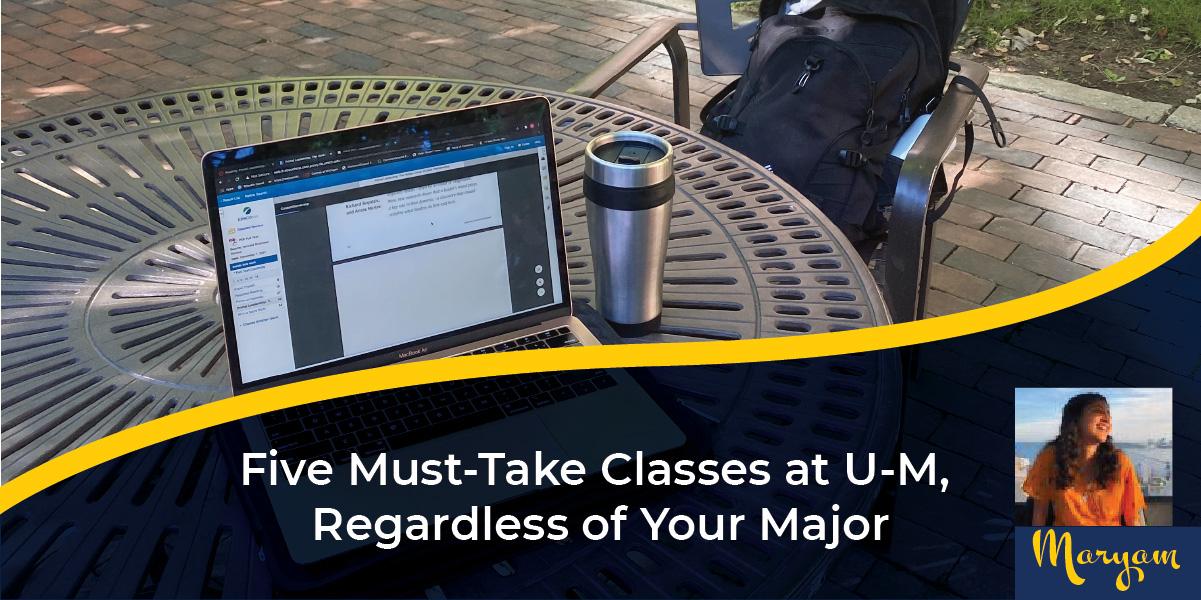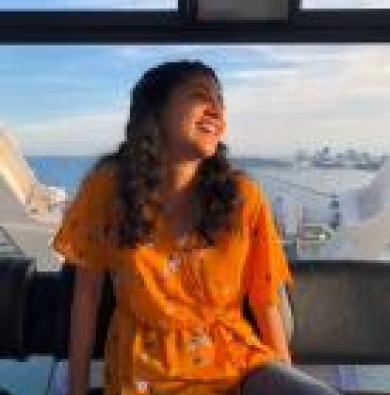Blog
Get the inside scoop about life at U-M and applying to Michigan from current student bloggers, Admissions staff, and guest faculty writers.

Get the inside scoop about life at U-M and applying to Michigan from current student bloggers, Admissions staff, and guest faculty writers.

Read about one U-M senior’s top classes to take before graduation, regardless of your major or program.

Heading into the final six weeks of my time at the University of Michigan, I’ve had some time to reflect on the classes I’ve most enjoyed. Below, I’ve compiled a list of my favorite classes that are open to all students, regardless of your major. A few of these classes are lesser-known and difficult to hear about unless you know someone who has taken them, so in this blog, I’ll give you an inside look at what you'll take away from these courses, why I think you should take them, and their average workload. Whether you’re a student in the College of Literature, Science, and the Arts (LSA) and looking for classes to knock out distribution requirements or any student looking to add variety into your curriculum, here are my top picks for classes to take before you graduate.
Credit hours: 4
Topics covered: Urban and planning history, planning law, land use, urban design, housing development, transportation, environmental planning
Why you should take it: While it’s labeled as a 400-level course, it’s open to all years and functions as an introductory course (like the title says) to the built environment. Some of the longer readings I found a little dry, while others on more recent examples that relate to the intersections of policy, planning, and the built environment were more intriguing. (Did you know that some towns are subsidizing Uber in lieu of public transit?). As far as workload goes, the class mainly consisted of reading assignments, weekly quizzes during discussion hours, and a few take-home papers, all of which were generally reasonable in ask and length.
I took this class during the semester we were sent home due to COVID-19 and distinctly remember the final paper being the last thing between the school year and summer vacation. I include that to emphasize that it’s pretty remarkable that I have positive things to say about the class in consideration of the time frame!
Credit hours: 3
Topics covered: Fiction writing
Why you should take it: Creative writing classes aren’t for everyone, but I included this example to encourage all students to take a class that tests your creative side. Even if you’re in the School of Music, Theatre & Dance (SMTD) or Stamps School Of Art & Design (Stamps), I’d encourage you to take a creative expression (CE) class outside your area of study. Generally, to be accepted into English 323, you need to either minor in creative writing, major in English with a sub-concentration in creative writing, or have taken the prerequisite coursework (English 223). Non-minors and majors in creative writing have to submit a piece of fiction in order to be enrolled in the course. Because I took this class in the spring semester, I was able to bypass both the writing submission requirement and the English 223 prerequisite since there’s generally a smaller enrollment in the spring and summer terms.
The main work product of the class was 40 pages of polished fiction (which could consist of multiple short writings), attending a few author readings, some light writing exercises here and there, and occasional short story reading assignments. Most of the class time was workshopping your own or other people’s writing, so there were very few times the class felt dull. It’s a great and light atmosphere to get instant and regular feedback on your writing. One of my main takeaways from the class? I use too many em dashes.
Credit hours: 1.5
Topics covered: Customer retention and churn, customer lifetime value, residual lifetime value, non-subscription versus subscription purchase predictions
Why you should take it: I’m an organizational studies major who is pursuing a career in marketing. It’s tricky trying to enroll in marketing classes because most of them are limited to Ross students. However, there are a few classes that are open to non-Ross students, and MKT 426 is one of them. The class uses statistics to build probability models of customer behavior in Excel. While the class is on the technical side, it covers how to translate the statistical components of the course to marketing/business terminology. The workload consists of weekly problem sets, occasional class preparatory exercises, and a final exam. Because the class takes place in half of a semester, you cover a lot of material in a short amount of time, but also have the benefit of having a lighter course load later in the semester. Anyone who is interested in understanding customers better, product planning, marketing, statistics, psychology, and practical Excel applications would probably enjoy this course.
Credit hours: 4
Topics covered: Sequences, code blocks, iterations, conditionals, dictionaries and dictionary accumulation, files, functions, sequence unpacking, indefinite iteration, default and keyword arguments, sorting, nested data, JSON, list comprehension, map, filter, zip, internet APIs, information theory, the Turing test
Why you should take it: SI 106 is a programming class based on informatics applications. It’s a little more beginner-friendly than an introductory electrical engineering and computer science (EECS) course because Python is the primary programming language used. If you’re looking to gain basic coding experience in a slightly lower-pressure environment than EECS, SI 106 is an excellent option. The workload is fairly high, with weekly problem sets that typically require attending office hours to manage and a few exams. I lowered the stakes for myself and took the course as Pass/Fail, but generally people who take it for credit perform well (average is in the B range) in case your schedule is less flexible.
Credit hours: 3
Topics covered: The triple bottom line, the tragedy of the commons, sustainability metrics and reporting, governance, stakeholder theory, circular economy, sustainable supply chain management, greenwashing, environmental product design, business structures
Why you should take it: I took this course in the winter semester of my first year and it propelled me to apply for organizational studies the following year. Sustainability applications within business is a trending topic, and being familiar with the terminology used within sustainable business is useful for people going into any career, especially those interested in working in a corporate environment. I was a TA (teaching assistant) for the course my junior year, and the second time around, the material was equally as intriguing. The workload is on the higher side for a 3-credit course, but the assignments themselves are manageable and mainly consist of quick write-ups on case studies, a group project, and a final, usually take-home, exam. Relative to other large-sized lectures, it’s very common for student participation to take up a moderate chunk of lecture time, so if you have a lot of hot takes, I would advise you to take the class the next time it is offered.

Maryam Masood (she/her) is a senior in the College of Literature, Science, and the Arts majoring in Organizational Studies. During the year, she keeps busy managing the Michigan Refugee Assistance Program and working as a trainer at Rec Sports. Outside of class and work, she can most likely be found making another cup of coffee, procrastinating at the CCRB, or rewatching Kim's Convenience on Netflix.